Positions & Papers
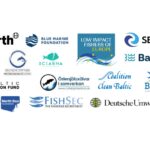
Joint follow up letter to Commissioner Kadis on ICES scientific advice
December 10, 2025
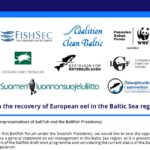
Statement on the recovery of European eel in the Baltic Sea region
September 18, 2025
Statement on the recovery of European eel in the Baltic Sea to all representatives of Baltfish and the Baltfish Presidency. Jointly signed by eight NGOs. The signatories highlight the urgent need for stronger, coordinated measures to protect the critically endangered European eel. Despite long-standing EU regulations, HELCOM commitments, and additional protective measures, progress on recovery has been slow and limited. The most recent ICES advice (2024) calls for zero catch of eels at all life stages across all habitats, yet significant commercial and recreational catches continue in the Baltic region. Restocking practices are not considered true conservation measures under EU law, as they primarily sustain fisheries rather than recovery. The signatories call for:
- A full closure of all eel fisheries until the population has recovered.
- Agreement on a regionally coordinated approach to protect eel migration, based on science and best available knowledge about migration routes.
- That national eel management plans prioritise other measures, such as restoration of habitats and migration routes, that will aid eel recovery.
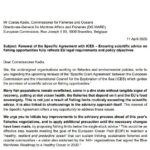
Letter to European Commissioner Kadis regarding the renewal of the Specific Grant Agreement with ICES
April 16, 2025
This joint letter, co-signed by 17 organisations working on EU fisheries and environmental policies, was sent to the European Commissioner for Fisheries and Oceans, Costas Kadis, ahead of the 2025 renewal of the Specific Grant Agreement with the International Council for the Exploration of the Sea (ICES) which guides the provision of scientific advice on fishing opportunities. In the letter, we highlight that the current ICES advice on fishing opportunities does not fully reflect all relevant legal requirements and policy objectives applicable to the EU or the core aims of the European Ocean Pact, including the goal to maintain a “healthy, resilient and productive ocean”.
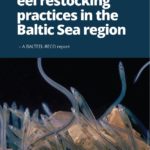
Investigation of eel restocking practices in the Baltic Sea region – a BALTEEL-RECO report
February 15, 2024
This report is focused on restocking of European eel in four EU countries around the Baltic Sea: Estonia, Latvia, Lithuania and Sweden. The report was produced as part of the collaborative project Baltic Sea eel recovery from an ecosystem perspective (BALTEEL-RECO), which aims to promote a more coordinated approach to eel recovery in the Baltic Sea region.
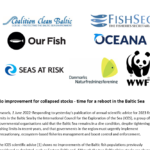
Press reactive on ICES advise: No improvement for collapsed stocks – time for a reboot in the Baltic Sea
June 1, 2022
In October 2022, EU fisheries ministers will agree on fishing opportunities in the Baltic Sea for 2023. Our joint NGO response to the annual scientific advice for 2023 fishing limits in the Baltic Sea by the International Council for the Exploration of the Sea (ICES) states that the Baltic Sea remains in a dire condition, despite tightening of fishing limits in recent years, and that governments in the region must urgently implement precautionary, ecosystem-based fisheries management and boost control and enforcement. Read the NGO press reactive here.
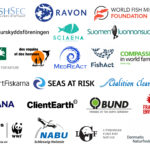
NGO response to DG MARE consultation on how to implement the ICES advice on eel
May 10, 2022
The European eel needs a break. It used to be so common that it made up more than 50% of all freshwater biomass in many countries. That is almost impossible to imagine today. A joint response by 22 NGOs to DG MARE consultation providing recommendations on what we believe needs to be done to implement the ICES advice on European eel can be found here.
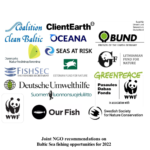
Updated FINAL NGO recommendations Baltic TACs 2022 based on ICES advice for salmon and western baltic cod
October 8, 2021
When our first Joint NGO recommendations Baltic TACs 2022 was released International Council for the Exploration of the Sea (ICES) had not been able to produce their advice for a number of stocks. As soon as the advice was released the Joint recommendations was complemented with a non-paper that was circulated to stakeholders. This updated version of the joint recommendations includes the final recommendations from the non-paper. In October 2021, EU fisheries ministers will agree on fishing opportunities in the Baltic Sea for 2022. We have provided a range of recommendations regarding the principles for setting sustainable fishing quotas in line with the Common Fisheries Policy and also specific recommendations for the Total Allowable Catches for each of the Baltic fish stocks that are managed by quota. Read the NGO briefing. 211008 FINAL Joint NGO recommendations Baltic TACs 2022
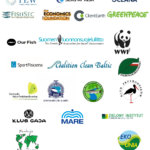
Letter to Baltic Ministers on Council TAC deliberations for 2020
October 10, 2019
Over 80 NGOs have written to ministers ahead of the October fisheries council meeting at which fishing limits will be set for next year. The letter states that "We welcome the progress that has been made in increasing the number of catch limits set in line with scientific advice. Nevertheless, we remain very concerned that, according to the latest report from the EU’s Scientific, Technical and Economic Committee for Fisheries (STECF), more than 40%of the North-East Atlantic stocks are still subject to overfishing. Furthermore, we note with serious concern that the rate of progress toward meeting the requirement to end overfishing has slowed in the last few years, making additional and urgent efforts necessary to restore stocks to healthy levels." In addition, "we would welcome an unequivocal commitment from you that you will do your utmost to meet the Article 2(2) requirements of the CFP...We urge you to strongly and openly oppose recommendations that do not follow the scientific advice of the International Council for the Exploration of the Sea (ICES) and the CFP Article 2(2) objective."
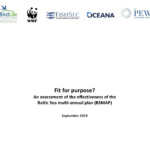
An assessment of the effectiveness of the Baltic Sea MAP
September 24, 2019
Fit for purpose? An assessment of the effectiveness of the BSMAP is a joint analysis of the Baltic Sea Multiannual Management Plan (BSMAP) by Pew Charitable Trusts, Birdlife International, WWF, FishSec and Oceana. We conclude that the BSMAP has failed to improve fisheries management in the Baltic Sea. The state of the Baltic ecosystem and its fish stocks speaks for itself. In place since July 2016, the BSMAP, was the first management plan adopted by the EU after the reform of the Common Fisheries Policy in 2013. Having been in place for three years it is being evaluated by the European Commission and has had a stakeholder consultation. We conclude that the BSMAP has failed to improve fisheries management in the Baltic Sea and recommend that MAPs and the CFP definine a maximum level of fishing mortality in future. The state of the Baltic ecosystem, its fish stocks and the decision-making process speaks for itself.
- MAPs were introduced in the CFP to address three specific challenges: the need for longer-term (multiannual) management geared towards achieving the CFP’s objectives; the need to take into account regional and ecosystem specificities; and the desire to bring decision-making closer to the regions in question.
- The Baltic MAP was instrumentalised to serve other purposes, key among which was the facilitation of the implementation of the LO and providing decision-makers with flexibility regarding fisheries management – not only in the Baltic region, but first and foremost in other European seas.
- The flawed design of the Baltic MAP led to management decisions and fishing practices that have failed to fulfill the intent of the CFP and achieve the MSFD’s Good Environmental Status target. The intended regionalisation elements have failed to ensure the MAP delivers on the specific needs of the Baltic in a timely manner, and lastly the MAP has failed to help deliver TACs in line with MSY and scientific advice.
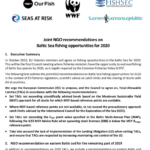
Joint NGO recommendations on Baltic Sea fishing opportunities for 2020
June 10, 2019
- Set TACs not exceeding scientifically advised levels based on the Maximum Sustainable Yield(MSY) approach for all stocks for which MSY-based reference points are available.
- Where MSY-based reference points are not available, to not exceed the precautionary approach catch limits advised by the International Council for the Exploration of the Sea (ICES).
- Set TACs not exceeding the FMSY point value specified in the Baltic Multi-Annual Plan (MAP), following the ICES MSY Advice Rule when spawning stock biomass (SBB) is below the MSY Btrigger reference point.
- Take into account the lack of implementation of the Landing Obligation (LO) when setting TACs, and ensure that TACs are respected by increasing monitoring and control of the LO.